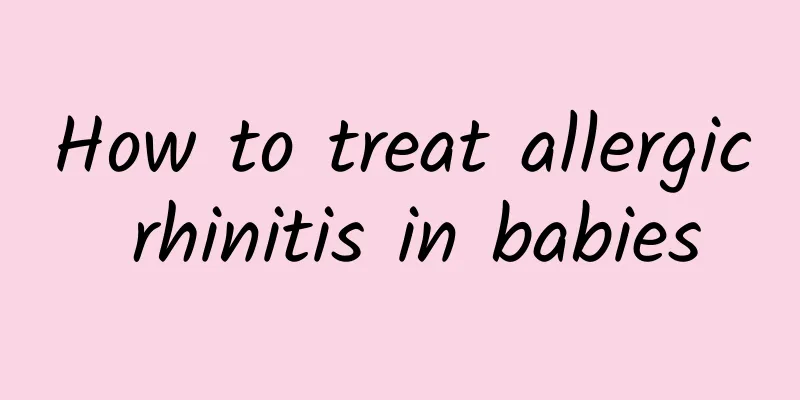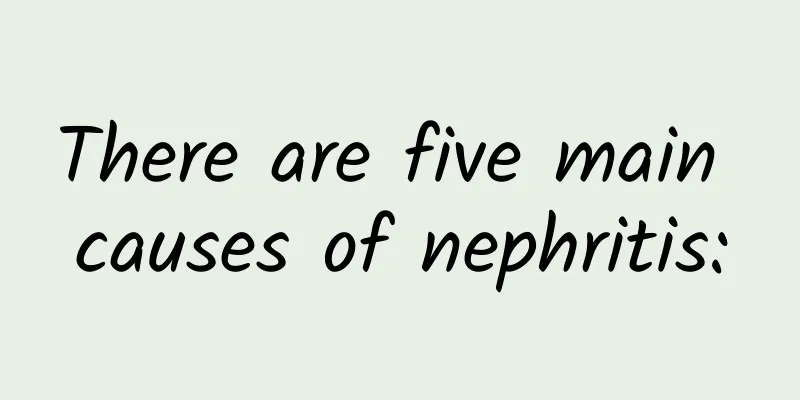How to treat allergic rhinitis in babies

|
The baby's immunity is not yet fully developed and is easily affected by seasonal changes and external dust, pollen, animal hair, etc., which can lead to allergic rhinitis. At this time, timely treatment must be carried out. First of all, parents or doctors should understand which inducing factors cause the allergy, and must adopt desensitization therapy in time to stay away from these allergens. If it is more serious, medication can be used under the guidance of a doctor. How to treat allergic rhinitis in babies If you have allergic rhinitis, you should go to the hospital for examination and treatment as soon as possible. Since this is a common disease, it is now being studied all over the world and great results have been achieved. During the examination, the first thing to do is to find out what the baby is allergic to, which is medically called allergens. If contact with allergens can be avoided, the baby will naturally not get sick, such as fish, shrimp, eggs in food; but allergens in the air are difficult to avoid, so desensitization therapy can be used. Of course there are many types of drug treatments. There are many methods for treating allergic rhinitis. The treatment effects vary from person to person, but some treatments are very effective. There are two types of desensitization therapies for treating allergic rhinitis, one is specific desensitization and the other is nonspecific desensitization therapy. Specific desensitization therapy is to purify various allergens and make them into injections. After performing skin tests on patients to find out the allergic substances, these allergic substances are used for desensitization treatment. Nonspecific desensitization therapy is a desensitization therapy using histamine. The patient is first given a skin test with different concentrations of histamine to find the lowest drug reaction concentration, and then desensitization therapy is performed. The former method is specific and has good therapeutic effect, while the latter method has poorer efficacy. Causes of allergic rhinitis in babies Exposure to allergens in life: The cause of seasonal attacks of allergic rhinitis is also the stimulation of allergens in the environment. Pollen, indoor dust, fungi, animal dander and feathers, house dust mites, etc. are allergens of allergic rhinitis; as well as foods such as milk, fish, shrimp, beef, and mutton, which can easily induce allergic rhinitis. Suffering from asthma: Children with a family history of asthma or allergic rhinitis have a 2-6 times higher risk of developing allergic rhinitis and a 3-4 times higher risk of developing asthma than the general population. Most children develop rhinitis first and then asthma; a small number of children have asthma first and then rhinitis; or both occur at the same time. It can be seen that there is a significant correlation between allergic rhinitis and asthma. Family inheritance: Babies with a family history of allergies have a much higher incidence rate than normal babies and are prone to allergic rhinitis. This kind of inheritance is not hereditary allergic rhinitis, but hereditary allergic constitution. |
<<: Symptoms of allergic cough in three-month-old babies
>>: What causes acute encephalitis?
Recommend
Can pregnant women drink walnut soy milk?
There are many ways to eat walnuts. They can be e...
What are the taboo parts for alcohol cooling?
In recent times, due to the sudden changes in tem...
What are the effects of August fry
August Explosion is the fruit of wild plants and ...
What are the taboos of drinking Huanglian soaked in water?
Many people in our lives know a proverb that goes...
Detailed explanation of sciatica symptoms
The most common experience for patients with scia...
The nutritional value of goubangchu
Many people may be unfamiliar with Gou Bangchui. ...
My period has been delayed for 3 days and has not come yet
Regular menstruation can help you calculate your o...
How to calculate the number of times Chinese medicine is boiled twice?
The decoction of Chinese medicine is an important...
What to use for foot bath if you have athlete's foot
Even though having athlete's foot is a very e...
No matter how good your foot bath is, it will be useless if you don't know how long to soak it.
The feet are the base camp of yin blood, and the ...
Can I wash my vulva during menstruation?
Women have menstruation every month, and they are...
Treatment of dizziness after brain injury
Of all the injuries, brain injury is the most ser...
What to drink to relieve heat
According to TCM theory, getting "hot" ...
Pain below the belly button
Pain below the navel is generally caused by abdom...
What are the benefits of mulberry fruit wine?
What do men value most? From a health perspective...









